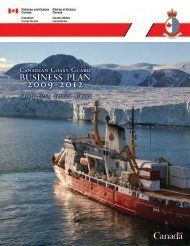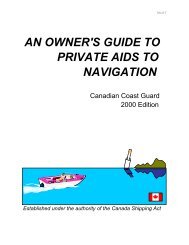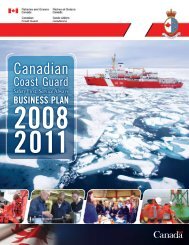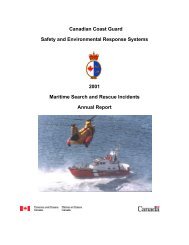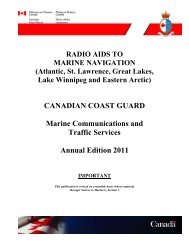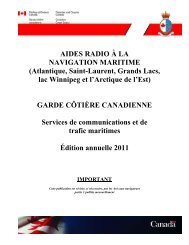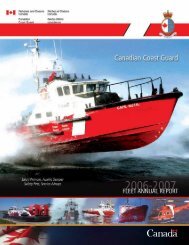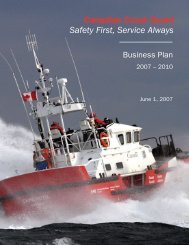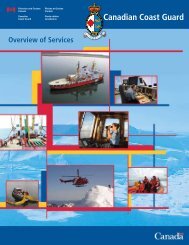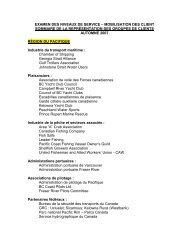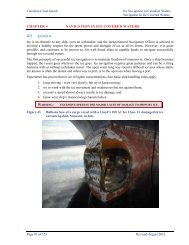PART 4 - Canadian Coast Guard
PART 4 - Canadian Coast Guard
PART 4 - Canadian Coast Guard
Create successful ePaper yourself
Turn your PDF publications into a flip-book with our unique Google optimized e-Paper software.
Alerting the Search and Rescue Authorities (MSC/Circ.892)<br />
1. The need for the earliest possible alerting of the search and rescue (SAR) co-ordination authority to maritime<br />
emergencies cannot be over-emphasized<br />
2. It is essential to enable shore-based facilities to respond without delay to any situation which constitutes, or has the<br />
potential to constitute, a danger to life. Time lost in the initial stages of an incident may be crucial to its eventual<br />
outcome. It cannot be regained.<br />
3. Factors to be considered include position (in relation to hazards and to shore-based or other SAR units); time of day;<br />
weather conditions (actual & forecast); the number of persons at risk or potentially at risk; specific assistance<br />
required, etc.<br />
4. It is always best to consider the 'worst-case scenario' and to alert the SAR organization accordingly. Depending on<br />
the circumstances, the co-ordinating authority may choose to alert or despatch SAR facilities as a precautionary<br />
measure and/or to reduce transit times. If assistance is not subsequently required, any such positive response can be<br />
easily curtailed. But time lost through delays in notification can never be regained.<br />
5. It is therefore essential that the SAR co-ordinating authority be informed immediately of:<br />
i) all maritime SAR incidents;<br />
ii) any situation which may develop into a SAR incident; and<br />
iii) any incident which may involve or lead to danger to life, the environment or to property which may require<br />
action from the SAR services and/or other authorities.<br />
Operating guidance for masters of ships in distress or urgency situations*<br />
6. The following diagram shows standard procedures for distress/urgency message routing. It is for guidance only, and<br />
does not preclude the use of any and all available means of distress alerting.<br />
Is vessel to be abandoned ?<br />
No<br />
Is immediate help needed ?<br />
No<br />
A potential problem<br />
exists<br />
Yes<br />
Yes<br />
Yes<br />
Transmit distress<br />
call<br />
Transmit distress<br />
call<br />
Notify JRCC<br />
Embark in survival craft<br />
with VHF, EPIRB<br />
and/or SART, if possible<br />
No<br />
Response<br />
received<br />
No<br />
Response<br />
received<br />
Yes<br />
Yes<br />
Switch on EPIRB and<br />
SART immediately<br />
Communicate with<br />
JRCC and SRUs<br />
Communicate with<br />
JRCC and SRUs<br />
* To be considered in conjunction with IMO publication 969 - GMDSS Operating Guidance for Masters of Ships in<br />
Distress Situations (COM/Circ.108 of 23 January 1992).<br />
4-19



